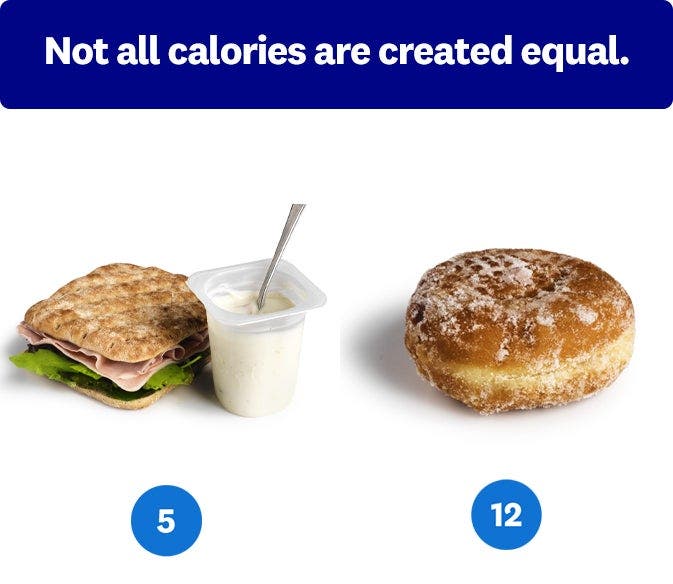Points tracking vs calorie counting


At WeightWatchers we are always innovating based on the latest science and our scientifically proven Points system. The Points system goes beyond calories (aka kilojoules) to take complex nutritional data from foods and boil it down into one simple, easy-to understand number: the Points value.
Our bodies take in calories (also known as energy) through food and burn calories through activity. Weight loss occurs when your body burns more calories than it takes in. And, when it comes to weight loss, a calorie is a calorie: eating 300 calories of hot chips will have the same impact as 300 calories of broccoli.
When it comes to how food impacts your body, calories tell part of the story, but not all. For example, 100 calories-worth of hot chips, while delicious, won’t provide the same nutrients that 100 calories of broccoli, chicken or eggs (also delicious!) would. Calorie counting alone without looking at other nutrients may not result in a healthy eating pattern, which is crucial for both weight loss and reducing the risk of disease.
Points vs calories
The WeightWatchers’ Points-system gives you what a calorie calculator can’t. For example, two meals might contain the same number of calories, but have a very different Points value.

Healthy eating made simple
We want to help you reach your weight-loss goals, but we also want you to eat what you love. The WeightWatchers Points Program guides you to a healthier pattern of eating—and that includes ALL foods. There are no weird rules or restricted foods, because that’s what makes WW sustainable and easier to follow. Along the way you’ll build a positive, healthy relationship with that food; one that can last a lifetime.
Our Points system takes complex nutritional science and distils it down to one easy-to-use number: the Point value. It’s based on six components:
Calories form the baseline.
Saturated fat (the less-good-for-you kind) and added sugars drive the number up.
Protein, fibre, and unsaturated fat (the better-for-you-kind) bring the number down.
It’s all backed by the latest nutritional science, and gently guides you towards a healthier pattern of eating with more foods that are higher in fibre, protein, and unsaturated fats and lower in added sugar and saturated fats.
Your Points Budget
You have your own Points Budget. It’s up to you how you spend it. Your budget is made up of:
- Daily Points. A starting point based on your metabolic rate—and of course, your goals!
- Weekly Points. An extra cushion to use any which way you decide each week.
- Rollovers. Up to 4 unused daily Points will automatically roll into your weeklies, so you can use them on another day.
The real secret to success
Be kind to yourself. When it comes to tracking—and your overall approach to eating—you don’t need to strive for perfection. That tends to lead straight to the "I’ve blown it" effect (that’s a scientific term), where an unplanned bowl of ice cream makes you feel like you might as well give up and go for seconds and thirds. Instead, try to stay on track most of the time: Follow your budget, make healthy choices, and keep going. This is a lifestyle, not a temporary fix.
The app makes tracking simple
The WeightWatchers app makes tracking your food and drinks quick and simple. You can save your favourite foods, check restaurant menus, and browse and create recipes. It’s even got a built-in barcode scanner so you can check the Points value of all your faves at the supermarket before you even put them in your cart.
The Points system is a proven framework that helps make healthier eating simpler. Points (and ZeroPoint foods!) help members establish an eating pattern that is liveable for the long run, discovering what food choices fit into their budget to help them meet their weight and health goals.
